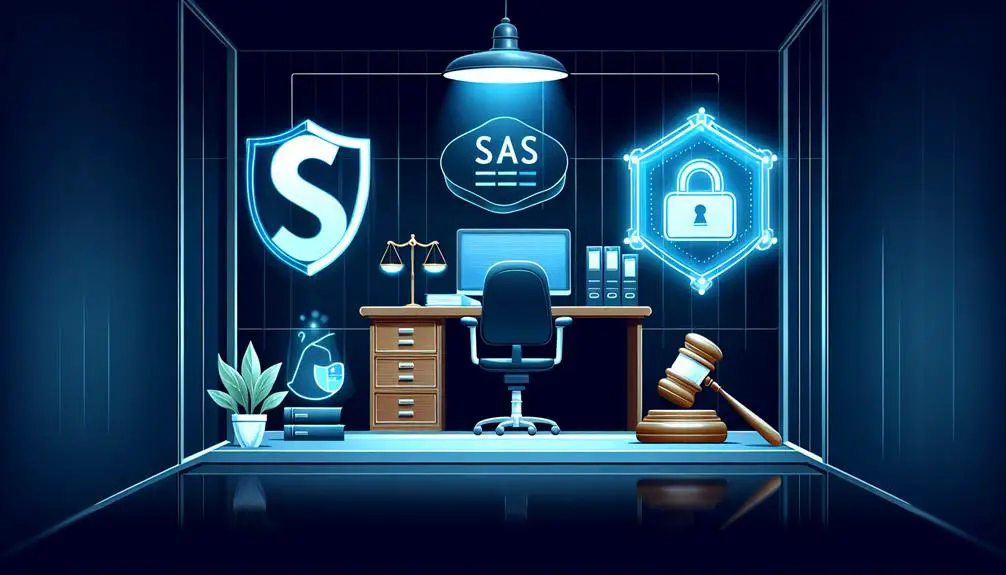Stepping into the SaaS arena is like setting sail on the vast ocean of digital entrepreneurship, where the tides of technology and commerce meet. You've got your idea, your skills, and a sea of potential customers, but there's a nagging question in your mind: Do you really need an LLC before you drop anchor and start selling?
An LLC isn't just a safety raft for your personal assets; it's a signal flag to customers that you're serious about your business. Sure, it comes with perks like tax breaks and a shield against the stormy seas of liability, but it's not free from the winds of paperwork and ongoing legalities. You're probably wondering whether the benefits outweigh the hassle.
And that's precisely what you're about to find out – how to navigate these murky waters and decide if an LLC is your golden compass to success in the world of SaaS.
Key Takeaways
- LLCs offer personal asset protection, shielding personal assets from business-related debts and legal issues.
- LLCs provide tax advantages and flexibility, allowing for pass-through taxation and the ability to deduct legitimate business expenses.
- Forming an LLC enhances credibility and legitimacy for a SaaS business, attracting investors and clients.
- Consulting legal professionals is important when considering forming an LLC for a SaaS business, as they can provide guidance on personal asset protection, tax advantages, and navigating international licensing requirements.
Understanding LLCs
When selling SaaS, forming an LLC can shield your personal assets from any business-related debts or legal issues. Let's get real: you're in it to make a buck and shake up the market, but you're not looking to bet the farm every time a challenge pops up. That's where an LLC comes into play.
A limited liability company (LLC) acts like a protective wall between your personal assets—your house, car, and grandma's heirloom watch—and the risks that come with doing business.
Creating an LLC isn't just about playing defense, though. It's a savvy move that sets you up with a legit business structure that's flexible. We're talking about taxes and management. You get to choose how you want to be taxed (hello, potential savings!) and how you want to run the show without some rigid playbook. Plus, when you're ready to scale, having that legal entity label adds a layer of credibility. Investors and customers take you more seriously when you've got those three letters after your business name.
But hey, don't jump the gun. If you're still hustling to validate your SaaS and get those first few die-hard users, focus on that first. Once you've got a grip on what your business is going to look like and the cash starts to flow more predictably, that's your cue to map out the LLC journey. It's not about if but when.
You want to be smart about your timing, balancing when to invest in creating an LLC with where your business is headed.
LLC Benefits for SaaS
Often, forming an LLC is a game-changer for SaaS entrepreneurs, offering a shield for your personal assets against potential business liabilities. Here's why you might want to consider it for your SaaS venture:
- Personal Liability Protection: An LLC creates a legal separation between you and your business. If your SaaS company ever faces a lawsuit, your personal assets—like your home or car—aren't typically at risk. The LLC acts as a barrier, protecting you from being personally on the hook for business debts and legal issues.
- Tax Benefits: LLCs offer flexibility in how you're taxed. You can opt to be taxed as a sole proprietor, partnership, or corporation. This means you can choose the structure that best minimizes your tax bill. Plus, you can pass through profits and losses directly to your personal income, avoiding the double taxation that corporations can incur.
- Credibility with B2B Customers: When you're dealing with other businesses, having an LLC can signal that you're serious and stable. This can make invoicing and signing legal agreements smoother, as companies often prefer to deal with a formally recognized business entity.
- Safeguarding Intellectual Property: Your SaaS is built on unique code, design, and perhaps content. An LLC can help protect this intellectual property by establishing your business as a separate legal entity, which can hold these assets. This separation can be critical in preventing personal entanglements with your intellectual property rights.
Personal Asset Protection

Building on the idea of LLC benefits for your SaaS venture, it's crucial to consider how personal asset protection plays a key role in safeguarding your hard-earned assets from any business mishaps. When you're knee-deep in coding and customer acquisition, the last thing on your mind is someone coming after your personal savings or real estate. But here's the deal: if you're operating as a sole proprietorship, you're essentially the business. That means if things go south, your personal assets are on the line.
Now, you might be thinking, 'Do I really need an LLC just to sell software?' Well, let's put it this way: an LLC creates a legal barrier between your company's finances and your own. Imagine your SaaS accidentally disrupts someone's business operations, and they decide to sue. If you're trading under your personal name, your personal bank account, house, and everything else you own could be at risk. Not fun, right?
With an LLC, only the assets owned by the business would typically be up for grabs. It's like having a shield around everything you've worked hard for personally. This layer of separation gives you the freedom to innovate and take calculated risks without worrying about losing your shirt in the process.
Tax Advantages Explained
Aside from shielding your personal assets, setting up an LLC for your SaaS business can also lead to notable tax benefits. Let's break down how an LLC can optimize your business tax situation:
- Pass-through Taxation: Unlike corporations, an LLC isn't taxed as a separate entity. Instead, the profits and losses of your business pass through to your personal tax return. This means you're not subject to double taxation like a C corp would be, where both the company's profits and your dividends get taxed.
- S Corp Election: If it suits your financial situation, your LLC can choose to be taxed as an S corp. This can potentially save you some money on federal income taxes. With an S corp, you can pay yourself a reasonable salary and take the rest of your business income as distributions, which aren't subject to self-employment tax.
- Business Deductions: Running an LLC allows you to write off legitimate business expenses, such as software subscriptions, hosting fees, and marketing costs, reducing your taxable income. These deductions are crucial for a SaaS business where recurring costs can be significant.
- Flexibility: The LLC structure offers more flexibility than a traditional corporation when it comes to allocating profits and losses. You can create an operating agreement that tailors the financial rights of the LLC members, which can be more tax-efficient for your specific situation.
LLC Credibility Factors

While setting up an LLC can save you money on taxes, it also bolsters your business's reputation, making it more attractive to clients and investors. When you're forming an LLC for your new business, you're not just checking a legal box; you're also sending a message that you're serious about your venture. It's like putting on a sharp suit for a meeting—people take notice.
An LLC tells customers you've got skin in the game. You're committed. Plus, having a business account separate from your personal finances looks professional and keeps things tidy. And if you're aiming to grow, which you probably are, appearing credible can help attract those angel investors or VCs you're eyeing.
Now, about that peace of mind. With an LLC, you've got a registered agent service handling official documents, which means one less thing to worry about. It's like having a dependable assistant who's got your back. And let's not forget the lawsuit shield—an LLC can protect your personal assets if things go south.
Check out this table, it breaks down why an LLC could be your new business's best friend:
| Credibility Factor | Benefit for Your SaaS | Why It Matters |
|---|---|---|
| Formal Structure | Professional Image | Signals commitment and stability |
| Asset Protection | Peace of Mind | Protects personal assets from business debts |
| Funding Appeal | Attracts Investments | Demonstrates growth potential to investors |
Forming and Maintaining LLCs
If you're thinking about forming an LLC for your SaaS business, knowing the steps and requirements is crucial for protecting your assets and simplifying your tax situation. LLCs offer a shield for your personal wealth, and they can make taxes less of a headache. Plus, they're pretty flexible when it comes to how you run your company.
Here's a quick rundown of what you'll need to do:
- Choose a Name for Your LLC: Pick something unique, but also make sure it's available in your state and doesn't infringe on any trademarks.
- File the Articles of Organization: This is the formal paperwork you submit to the state to officially start your LLC. Each state has its own rules, so check what's required where you are.
- Create an Operating Agreement: Even if your state doesn't require it, this document is key. It outlines ownership, how you'll make decisions, and what happens if someone wants out.
- Get Your EIN: That's your federal tax ID number, and you'll need it for tax filings and to open a business bank account.
Remember, forming and maintaining LLCs isn't a one-and-done deal. You've got ongoing responsibilities, like annual reports and keeping your personal and business finances separate. It's not super complicated, but you do need to stay on top of it.
Think about the type of business you're running. SaaS is hot right now, and having an LLC can give B2B customers more confidence in you. Plus, it helps with payment gateways and keeps you clear of personal liability if things go sideways. If you're serious about your SaaS venture, forming an LLC could be a smart move.
Alternatives to LLC Structure

When considering how to structure your SaaS business, it's important to know that an LLC isn't your only option. You've got a slew of structures to choose from, each with its own perks and quirks.
Take the sole proprietorship, for instance. It's the simplest way to start selling your software with minimal paperwork, but it does leave your personal assets on the line if things go south.
Got a partner? Well, a general partnership might fit the bill. It's easy to set up, and you'll share the load. But again, personal liability is a thing. If you're looking to dodge that, an LLP could be the way to go. It offers some protection, and it's great for several owners.
For those of you with big dreams and growth on the mind, check out the corporation route. S corporations can be a sweet deal because they let income, losses, deductions, and credits flow through to your personal tax return. This can save you from double taxation—once on the company income and again on the dividends. But don't forget about the rigid rules and the extra paperwork.
C corps are the big guns—ideal for going public or attracting investment from third parties. They're taxed separately from you, so personal tax isn't a direct issue. But, income taxes hit at the corporate level and then again on your personal income if you pocket dividends.
Consulting Legal Professionals
Consulting a lawyer can save you a ton of headaches down the road, especially when deciding if and when to file an LLC for your SaaS startup. Navigating the legal landscape isn't just about ticking boxes; it's about making the right choice for your business and your personal peace of mind.
Here's why you might need to chat with a legal pro:
- Personal Asset Protection: You're in this to make a splash in the tech world, not to risk your personal savings. An LLC can separate your personal assets from your business liabilities. That's a safety net worth considering.
- Tax Advantages: The IRS treats LLCs in a unique way that could benefit your financial situation. A legal expert can help you understand complex tax codes and avoid paying more than you should. Getting this right from the start can be a game-changer for your profit margins.
- Understanding Your Full-time Commitment: If you're all in on your SaaS gig, you'll want to ensure you're set up for success. A part-time hustle mightn't need the same level of legal structure as a full-time enterprise. A lawyer can help you assess the need based on your commitment level.
- Global Licensing Requirements: Selling worldwide? The rules change when you cross borders. A legal consultant can help you navigate international waters without capsizing.


